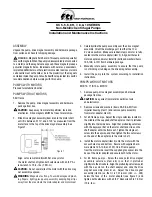
WK
10.6 Sending the Pump back to our Works
If the pump is sent back to our Works for repairs or overhaul, it
should be despatched completely assembled in order to
prevent any possible damage to the sealing faces during
transport. All pipe connections and flanges should be plugged
or blanked off, after the pump has been drained. The pump
should be securely mounted on a transport frame for despatch
(see Figs. 52 and 53).
11. Dismantling the Pump
11.1 Preparations prior to Dismantling
1.
Close all isolating valves in the suction and discharge
lines, and also, if applicable, in the cooling liquid, sealing
liquid or flushing liquid lines, and drain the pump via the
drain apertures (6B) in the suction and discharge casings
(106 and 107).
2.
Dismantle and remove cooling liquid, sealing liquid or
flushing liquid lines.
3.
Pull out stuffing box gland (452) and remove stuffing box
packing (461.1).
4.
Disconnect coupling (see section 1.6 ‘‘Couplings’’). Check
pump alignment at the coupling and make a note of the
measurements (see section 8.3 ‘‘Alignment’’).
5.
If the pump is to be dismantled completely, unscrew the
fixing bolts on the suction and discharge lines and on the
pump feet, and remove the pump from the baseplate.
6.
Drain off the oil fill in the bearing housing by unscrewing
drain plug (903.4/.5).
11.2 Dismantling the Bearings
11.2.1 Dismantling the Drive End Bearing
1.
Pull off the half coupling with the aid of an extractor (see
Figs. 54 and 55).
Fig. 54 Wheel puller
2.
Remove bearing cover (360).
3.
Bend back tab washer between ring nut of adaptor sleeve
and cylindrical roller bearing (322) (see Fig. 56).
Fig. 55 Pulling off the coupling hub
4.
Slacken withdrawal nut of adaptor sleeve (52.1) by a few
turns (see Fig. 57).
Fig. 56 Bending back the locking washer
5.
Loosen adaptor sleeve (52.1) on shaft (210) by gentle
taps on the end face of the withdrawal nut.
Fig. 57 Pulling off the coupling hub
Fig. 53 Transport frame, Pump feet at bottom
15
















































